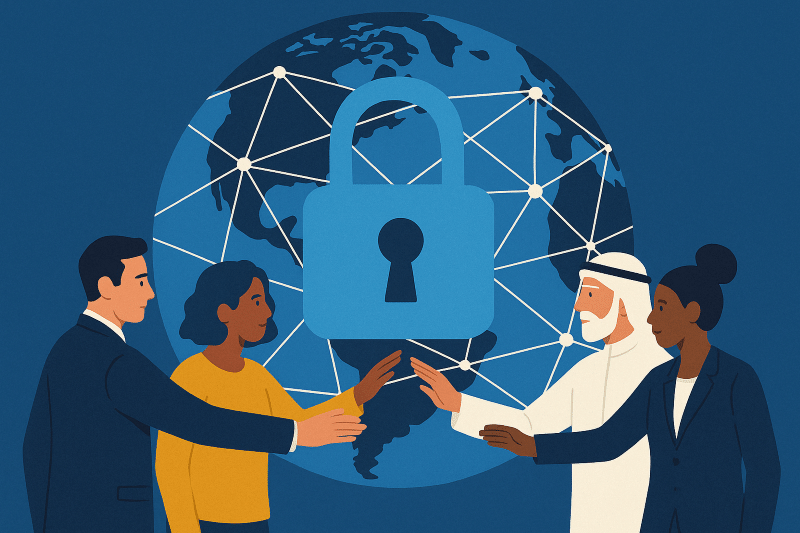
Jochen Michels, Director Public Affairs Europe, Kaspersky
In a world shaped by digital interdependence and geopolitical rivalry, the question arises: can actors from across the globe truly collaborate on cybersecurity when trust is strained? The answer – routed in necessity – is yes. Despite political tensions, international multistakeholder cooperation on cybersecurity remains not only possible; it is essential.
Cyber threats respect neither borders nor alliances. A ransomware attack launched on one continent can cripple critical infrastructure – such as hospitals – on another. Malware embedded in global supply chains can impact both allies and adversaries alike. The shared nature of these threats makes clear that no single country or no single actor – no matter how powerful – can tackle cybersecurity challenges alone.
Even in times of political friction, cooperation offers critical benefits: it secures the digital infrastructure that powers the global economy and enables coordinated responses to cybercrime. Crucially, collaboration also defends the public services people rely on every day – including healthcare systems, power grids, and communication networks – which are becoming prime targets in cyber warfare.
The Essential Role of the Private Sector
Much of the world’s digital infrastructure – including cloud platforms, data centers, software, and hardware – is owned and operated by the private sector. As a result, cybersecurity companies and technology firms are not merely stakeholders, but frontline defenders. Their contributions span real-time threat intelligence, the development of advanced defensive technologies, and incident response capabilities. In addition, the private sector plays a key role in shaping technical standards and in promoting secure-by-design products. Through public-private partnerships and cross-border initiatives, industry leaders can help build a more secure digital ecosystem – one that protects all users, regardless of geopolitical divisions.
Academia as a Bridge and Innovator
Academic institutions also play a vital role in this cooperative landscape. First, they serve as hubs of innovation, advancing foundational research in areas like cryptography, AI for cybersecurity, and secure network architectures. Second, they act as neutral platforms for dialogue and capacity-building, offering education and training to the next generation of cybersecurity professionals worldwide. Moreover, international research projects, conferences, and think tanks help foster trust, facilitate open knowledge exchange, and support the development of globally relevant cybersecurity norms and policy frameworks.
A Shared Responsibility
Despite ongoing tensions in the geopolitical sphere, the digital realm presents a rare but vital opportunity: to set aside differences in the pursuit of shared security and global stability. Governments, the private sector, and academia each have a distinct and indispensable role to play. In a domain where the next major threat could emerge anywhere, the safest path forward is one we walk together.
Kaspersky’s Engagement
As a global company, Kaspersky is committed to ensuring a secure digital future and prioritizes interinstitutional and international collaboration. The company actively participates in various global and regional associations, organizations, and initiatives to strengthen collective cybersecurity efforts. Additionally, Kaspersky maintains trustworthy partnerships with law enforcement agencies to effectively combat cybercrime.
United Nations
In recent years, Kaspersky has actively participated in United Nations initiatives, including the Open-ended Working Group on Security of and in the Use of Information and Communications Technologies, the Ad Hoc Committee to Elaborate a Comprehensive International Convention on Countering the Use of ICT for Criminal Purposes, and the Global Digital Compact. Each year, Kaspersky supports the IGF Annual Meeting. In 2024, the company was prominently represented with three workshops and a high-level address by its founder Eugene Kaspersky on the protection of children’s rights in the digital world.
Cooperation with Law Enforcement Agencies
Kaspersky teamed up with INTERPOL in the global fight against cybercrime, playing a key role in tackling fraud linked to the 2024 Summer Olympic Games in France by sharing threat intelligence as part of Project Stadia. The company also supported the Gateway Project through intelligence sharing as well as training efforts, and took an active role in Operations Synergia and Synergia II. These operations brought together private sector partners and law enforcement from 95 INTERPOL member countries across Europe, Africa, and the Asia-Pacific region in a coordinated response. In November 2024, Kaspersky further strengthened its commitment by signing a cooperation agreement with AFRIPOL. The company has also partnered for years with EUROPOL’s European Cybercrime Centre on the “No More Ransom” initiative.
AI Initiatives
In December 2024, Kaspersky joined the Global Alliance on Artificial Intelligence for Industry and Manufacturing (AIM Global), launched by the United Nations Industrial Development Organization (UNIDO). What is more, Kaspersky is a signatory of the pledge of the European Commission’s AI Pact. This initiative aims to prepare organizations for the implementation of the AI Act – the first ever comprehensive legal framework on AI worldwide, adopted by the European Union (EU). In addition, Kaspersky contributes to the work of the Policy Network on Artificial Intelligence (PNAI) of the IGF.
Further Activities
Alongside a wide range of initiatives and strong regional engagement with diverse stakeholders, Kaspersky also shares its expertise in numerous official consultations. The company's commitment to transparency stands out in particular. Its global network of Transparency Centers allows the review of the source code, of software updates, and of threat detection rules, among other key activities. These centers give governments and partners secure access to detailed information about Kaspersky products, including vital technical documentation, for independent assessment.
A Call for International Cooperation
Cybersecurity is a shared global challenge, and effective protection demands joint action from all relevant international stakeholders. The cybersecurity industry plays a pivotal role in enabling multistakeholder cooperation at the global level. That is why Kaspersky pursues a dedicated multi-stakeholder approach to international cooperation and actively shares its expertise. This model offers a valuable example for others seeking to boost resilience and to safeguard our interconnected digital world.
